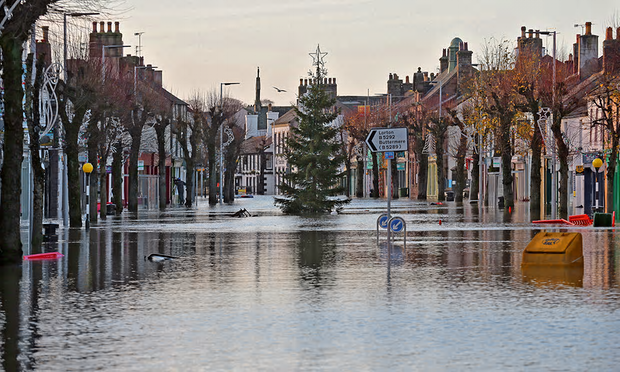Major flooding in UK now likely every year – because the Tories won’t invest in defences

The flooded high street in Cockermouth in the Lake District, days after Storm Desmond on December 6, 2015 [Image: Christopher Furlong/Getty Images].
The answer to seasonal flooding is well known. It requires the investment of public money but the amount concerned is tiny in comparison to the large-scale flood defences some ‘experts’ would like to present to us, in dazzling colour no doubt.
And money is still available from an EU fund to help deal with damage caused by a flooding emergency. It always was. But David Cameron was too timid to claim it and Theresa May is such a wet fish that she’d be at home in a flood and wouldn’t know why everybody was making a fuss.
The way the Conservatives have handled flooding is nothing less than pathetic – and therefore no different to the way they have handled anything else.
Major flooding in the UK is now likely to happen every year but ministers still have no coherent long-term plan to deal with it, the government’s leading adviser on the impacts of climate change has warned.
Boxing Day in 2015 saw severe floods sweep Lancashire and Yorkshire, just weeks after Storm Desmond swamped Cumbria and parts of Scotland and Wales. The flooding, which caused billions of pounds of damage, led to the government publishing a review in September which anticipates 20-30% more extreme rainfall than before.
But Prof John Krebs, who leads the work on adapting to global warming for the government’s official advisers, the Committee on Climate Change (CCC), told the Guardian: “We are still a long way from where we need to be, in that there is still not a coherent long-term view.”
Source: Major flooding in UK now likely every year, warns lead climate adviser | Environment | The Guardian
Join the Vox Political Facebook page.
If you have appreciated this article, don’t forget to share it using the buttons at the bottom of this page. Politics is about everybody – so let’s try to get everybody involved!
Vox Political needs your help!
If you want to support this site
(but don’t want to give your money to advertisers)
you can make a one-off donation here:
Buy Vox Political books so we can continue
fighting for the facts.
The Livingstone Presumption is now available
in either print or eBook format here:
Health Warning: Government! is now available
in either print or eBook format here:
The first collection, Strong Words and Hard Times,
is still available in either print or eBook format here:
- ☕ Support Vox Political on Ko-fi or donate via PayPal
- 📘 Buy our books — political analysis and satire you won’t find elsewhere
- 📨 Join the mailing list for real headlines, direct to your inbox
- 🔗 Follow us on Facebook and Twitter/X
10 Comments
Leave A Comment
you might also like
- ☕ Support Vox Political on Ko-fi or donate via PayPal
- 📘 Buy our books — political analysis and satire you won’t find elsewhere
- 📨 Join the mailing list for real headlines, direct to your inbox
- 🔗 Follow us on Facebook and Twitter/X
- ☕ Support Vox Political on Ko-fi or donate via PayPal
- 📘 Buy our books — political analysis and satire you won’t find elsewhere
- 📨 Join the mailing list for real headlines, direct to your inbox
- 🔗 Follow us on Facebook and Twitter/X
- ☕ Support Vox Political on Ko-fi or donate via PayPal
- 📘 Buy our books — political analysis and satire you won’t find elsewhere
- 📨 Join the mailing list for real headlines, direct to your inbox
- 🔗 Follow us on Facebook and Twitter/X










Basic building practise since the time of the Bible. Noha and the flood. You do not build on a flood plane.if you want to know how it’s done check out china’s forbidden city during the recent floods. Why can’t the UK do what they did way back. Oh money grabbing twas is the reason
The tories don’t give a flying F*** about any body but themselves.
Actually we can’t dredge because of eu regulations, so once we are out we can actually do something about it.
Wrong. Visit https://blogs.ec.europa.eu/ECintheUK/suggesting-that-the-eu-is-to-blame-for-floods-is-completely-without-foundation/
“The EU’s Water Framework Directive has been the piece of EU legislation most criticised by certain media, on the basis that it ‘bans dredging’.
“But that is incorrect – the Directive does not ban dredging.”
Please stop posting disinformation here.
Dredging makes the water flow faster.
If you drive your car fast down a straight road, accelerating all the time as it slopes downhill, what happens when you get to a bend and don’t slow down?
Answer- Your car shoots off the road.
It is the same with water.
And how many towns are built around bends in rivers?
There are a lot of myths and “disinformation” in media these days but the one about dredging stopping flooding is one of the most self evidently incorrect.
It is so blindingly obvious it is not true.
Where do you think the water goes? Just because a riverbed is smoothed out?
Flooding is prevented by slowing and spreading water flows, primarily by increasing absorbent vegetation in the river catchment.
To reduce flooding actually doesn’t require any govt expenditure at all, just changes in agricultural practice and upland land management; so most uplands are not bare hills; and crop fields are not left barren after harvest .
Beavers will do most of the work for you for free!
Thanks for the information about dredging.
This Writer advocate the flood prevention measures you describe, after they were tried by a UK town.
http://www.telegraph.co.uk/news/picturegalleries/uknews/10548683/UK-weather-in-pictures-Britain-hit-by-high-tides-floods-and-strong-winds.html
it would help if councils cleaned the drains,like they used to under council tax.
what the hell do we pay all this council tax for ? more and more money for less and less services.i wish someone with the time and expertise would get a petition up to abolish council tax,its nothing more than legalised robbery,paying for fat cat salaries and expenses for those who administer it.
I’m sorry but it is my belief that no amount of funding will solve the flooding problem unless, or until an holistic approach is adopted with regard to river management and flood protection.
If you sit in the road, sooner, or later, you will get hit by a vehicle. If you live in a river – aye, the flood plain is part of the river, not aside it, or next to it – sooner, or later you will get flooded; in addition, just as the person in the road will cause problems for the flow of traffic, when they get hit, so will building on the floodplain affect other parts of the river. Has there been any study into the effects of flood protection on flooding? I suspect that most, if not all new flooding, particularly in areas where, historically, there has never been flooding, is cause by flood defences being employed elsewhere in the river. Our rivers are complete systems; the bits don’t exist in isolation. Rivers are “living” entities and they will always try to do what they do. If we try to prevent them from doing that, there are consequences. We must learn to live with the rivers. By building on floodplains, we interfere with the river’s ability to regulate its flow and this will affect the flow of the river elsewhere. Why is nobody taking into account the effect of this irresponsible construction, which leads to demands from flood protection, which in turn create problems somewhere else along the river? Unless and holistic approach is taken and floodplain building ceases, flooding will become more common and in areas where, historically, there has never been flooding. Remember, too, that dredging alters the flow of the river, interferes with wildlife and will, ultimately, have an effect elsewhere. These things must be monitored, closely, because, by and large, our settlements prevent rivers from changing their courses.
Also, some flooding is caused by overwhelmed sewers, because of inadequate natural drainage. with no grass verges, on the roadside, gardens built on for drives, or flats; shopping centre car parks etc. the rain water is not absorbed into the ground but goes down the drain, instead. The sewers were not designed to carry that additional water and in times of heavy rainfall, the sewers can become overwhelmed. I remember, once, watching a report from a flooded town; the river was rushing by but had not burst its banks; the flooding came from the drains, manhole covers were pushed out. How is it that a land that has so much rainfall can experience drought? The water goes not into the ground, to top up the water table, but down the drains. there needs to be “joined-up thinking,” proper investigation, rather than knee-jerk responses to what are man-made problems but possibly not on the scale that most people seem to imagine.